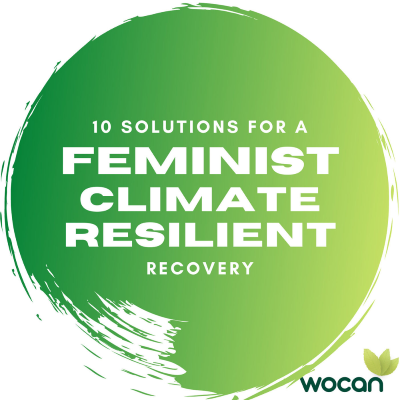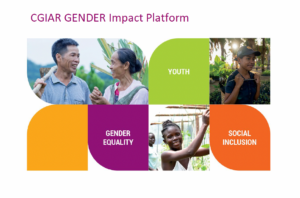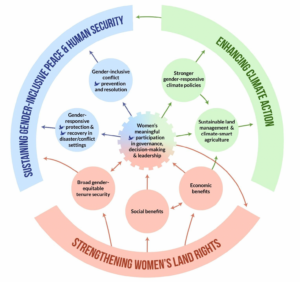Episode List
- #1: Compensation for Women’s Social and Environmental Contributions
- #2: Measuring impacts for increased transparency and results
- # 3: Institutional transformation and culture change
- #4: Recognizing and supporting women’s organizations
- #5: Capacity development to cope with and adapt to change
- #6: Investments with social and environmental impacts
- #7: Nature-based solutions
- #8: Feminist Leadership
- #9: Sustainable and inclusive food systems
- #10: Women’s increased access to climate investments
Episode List
In this episode, we talk with Dr. Jeannette Gurung about how compensating women’s social and environmental contributions is a solution for a more resilient post COVID-19 recovery. She presents the W+ Standard, the first women-specific standard that quantifies, values and monetizes the results of projects on women’s lives – and brings to light women’s contributions to climate-related projects. Those results are translated in W+ units available for sale. A share of the value of the W+ units goes to women engaged in the projects. For more information, visit www.wplus.org
Featuring:

Dr. Jeanette Gurung
In this episode, we talk with Cathy Lee about the importance of measuring impacts to ensure that funds will indeed support sustainable, climate-smart and inclusive initiatives, and contribute to ‘building back better’. She shares her perspective on the need for standards to go beyond ‘do no harm’ to women and gives the example of the W+ Standard, which supports transparency in evaluating claims of women’s empowerment and ensures that benefits that are claimed to be happening or promised in future, do in fact happen.
Cathy Lee is the Managing Director of Lee International, an international consulting firm that provides legal, regulatory and advisory services to clients around the world to help them mitigate and adapt to the impacts of climate change. Her clients have included developers, sellers and buyers of carbon credits in the compliance and voluntary markets around the world. Cathy is an attorney with 39 years of legal experience and 35 of them in the energy and environment sectors.
Featuring:
Cathy Lee

Joining us today on this podcast is Dibya Devi Gurung, a Core Associate of WOCAN, to talk about the role of women’s organizations in building social and climate resilience of communities. She shares her perspective from Nepal and calls for more recognition of the value and contributions of women to climate resilience and the urgent need to direct more resources to their organizations.
Dibya Devi Gurung holds a Masters Degree in biological science and has more than 24 years of professional experience in integrating gender and social inclusion issues in community based natural resource management, agriculture and climate change. She has worked and continues to work with various grassroots organizations, as well as international donor agencies and governments in Nepal and across Asia; conducting gender analysis, and supporting the integration of gender in national strategies, plans and programmes. Dibya was also nominated by the Ministry of Forest and Environment of Nepal, as a member of the REDD Implementation Coordination Committee.
Featuring:

Dibya Gurung
In this epsode, Colletah Chitsike shares her perspective on the capacities than are needed to cope with change and build resilience. She highlights the importance of participatory approaches such as Women Leadership Circles and mentoring and calls for more resources to be allocated for education and capacity development.
Colletah Chitsike is a trainer and capacity building specialist with a Masters Degree in Adult Education from the University of Zimbabwe. She has extensive experience in Community Development, Organizational Development and Gender Training for Change. She has previously worked with many international organizations such as OXFAM GB and NOVIB in Southern Africa and CIAT (Center for International Tropical Agriculture) as the Capacity Building and Learning Management Specialist in Africa. She serves as a WOCAN Associate and Gender Trainer. In this capacity, Colletah has led multiple trainings and workshops for WOCAN around the world.
Featuring:
Colletah Chitsike
In this episode, we speak with Neera Van der Geest, CEO of the FairClimateFund, a social venture that invests and trades in CO2 reduction certificates that benefit people, mostly women and children, that are most vulnerable to climate change to give them a more sustainable livelihood. Neera shares her perspective on the importance of investing for social and environmental impacts and calls for more transparency in the way impact is measured and how benefits are shared with those that enable this impact to happen.
Neera Van der Geest is graduated in Environmental Development Economics from the Agricultural University in Wageningen. She has always worked on the edge of economic development, poverty alleviation and environmental protection, for the private sector (engineering), public sector (Dutch government) and for the international NGO ICCO. Since 2008 she is CEO of ICCO’s FairClimateFund, which has invested almost 7 million euros in projects located in India, Burkina Faso, Ethiopia and Peru, India. The carbon credits are traded to corporates implementing a CSR policy on climate.
Featuring:
Neera Van der Geest
In this episode, we speak with Lorena Aguilar about nature-based solutions, and the important role that women play in the effective implementation of those solutions.
Lorena is a global leader passionate about inclusion and sustainable development issues, with extensive experience leading inclusive collaboration with government counterparts, UN agencies, international organizations and civil society. She has field experience in more than 50 countries across Latin America, the Caribbean, Eastern Europe, Africa, and Asia. As Global Senior Gender Advisor and Global Director of the Governance and Rights Program of the International Union for Conservation of Nature (IUCN) until 2018, Lorena has played a key role in putting women and girls at the center of conservation and climate initiatives, national and international policies.
Featuring:
Today we speak with Amanda Ellis about feminist leadership and what it means in the context of COVID-19 and commitments for a sustainable development. She talks about the correlation between gender balance in boards and governance bodies, and sustainability, and shares her insights on how to increase women’s participation in leadership and decision making.
Amanda Ellis currently serves as ASU Director Global Partnerships for the Global Futures Laboratory and Executive Director Hawaii/AsiaPacific for the Julie Ann Wrigley Global Institute of Sustainability. Previously New Zealand’s Head of Mission, Ambassador and Permanent Representative to the United Nations in Geneva and Prime Minister’s Special Envoy, Ms Ellis played a key role in New Zealand’s successful UN Security Council bid. Prior to that, as Deputy Secretary in the NZ Foreign Ministry Ms Ellis was the first woman to lead the NZ Aid program, managing an annual budget of $0.6 billion. Previous roles include Lead Specialist Poverty Reduction and Economic Management for the World Bank Group, (where she managed the President’s Global Private Sector CEO Leaders Forum and led the project that created “Women, business and the law”), Head of the Global Gender Group at the International Finance Corporation, and National Manager Women in Business at Westpac Banking Corporation. The author of two best-selling Random House business books and five research titles in the World Bank Directions in Development series, Ms. Ellis is a co-founder of the Financial Alliance for Women and the recipient of the TIAW Lifetime Achievement Award for services to women’s economic empowerment.
Featuring:
Amanda Ellis
Today we speak with Eve Crowley, FAO Deputy Regional Representative for Latin America and the Caribbean and FAO Representative in Chile, about the role of women in food systems, and how to design sustainable and inclusive food systems. She shares the example of the Food System Council of Lima (Consejo del Sistema Alimentario de Lima, CONSIAL), which takes an innovative holistic and gender responsive approach.
Prior to her appointment as FAO Representative in Chile, Eve Crowley was Deputy Director of the FAO Gender, Equity and Rural Employment Division at FAO Headquarters in Rome. Throughout her career, she has worked in poverty eradication, institutional strengthening, sustainable livelihoods, sustainable rural development, agriculture and rural employment, with a special attention to gender and social inclusion issues.
References to the Food System Council of Lima:
- Developing Sustainable Food Systems for Urban Areas: Piloting a holistic approach in Nairobi (Kenya), Dhaka (Bangladesh), and Lima (Peru)
- Lima consolida esfuerzos hacia un sistema alimentario sostenible
Featuring:
Eve Crowley
For this last interview of our podcast series, I am delighted to receive Evelyne Batamuliza to talk about women’s access to climate finance. We discuss the fact that gender equality is now well embedded in international climate frameworks and funds, but there is still very limited funding reaching women and women’s organizations. She calls for deliberate efforts to fill this gap, making sure that women are at the decision-making table when it comes to climate actions and climate finance at global and national level, and translating commitments into concrete mechanisms and actions that put more resources into the hands of women at the local level.
Evelyne Batamuliza currently serves as an Executive Committee Member of the Adaptation Benefit Mechanisms Initiative of the African Development Bank. Previously she worked as UNDP’s Advisor in the Asia Pacific Region for the Programme Strengthening Governance of Climate Change Finance. Evelyne has also an extensive career in post-conflict reconstruction, and was engaged in various global and regional initiatives for peace and reconciliation and to support women’s political participation in Africa.
Featuring:
Evelyne Batamuliza
The W+ Standard measures the results of women’s empowerment within the development and climate projects. Jeannette Gurung (Executive Director of WOCAN) discusses how the application of the W+ Standard to forestry programs of Nepal – a country with a rich history of women’s groups managing community forests – could provide a ‘best-case’ scenario to show the link between women’s empowerment and forest management.
The application of the W+ Standard and sale of W+ credits can provide recognition and compensation for women’s ‘invisible’ labor to support these women’s groups to maintain the forests.






